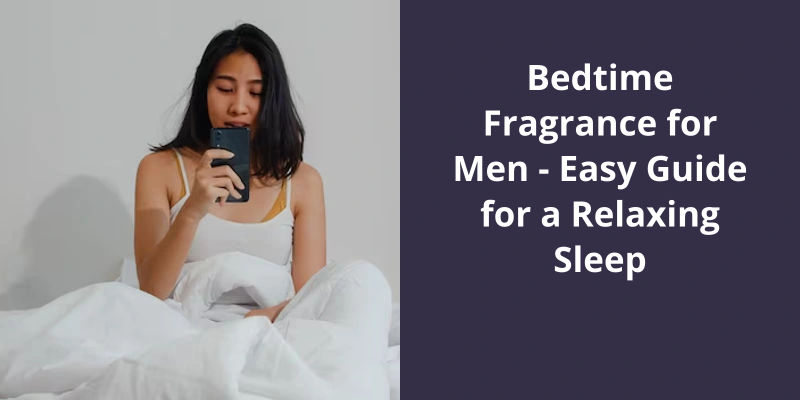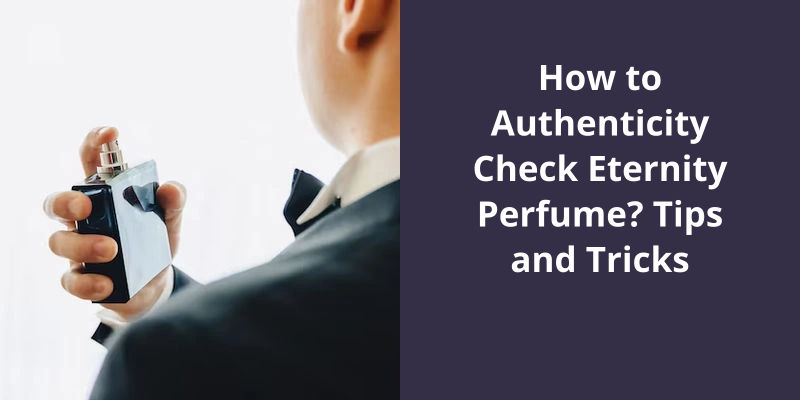People spray perfume in the air and walk through it because this method, also known as the “cloud method”, helps to evenly distribute the scent across their body. The fine mist that is created when perfume is sprayed into the air ensures that the perfume lightly covers their clothes, hair ,and skin without resulting in a overpowering smell. This also helps avoid any possible skin reactions or staining on the clothes that can happen when perfume is applied directly. Creating a scent cloud by spraying perfume in the air and walking through it can contribute to a more subtle, all-round fragrance experience.

What Happens to Perfume in the Air?
As the perfume spreads, it starts to interact with the environment and the air particles around it. The scent molecules try to bond with the air particles in the surrounding area and in turn, they give off a scent. This is why you can often smell a faint essence of perfume even after the person wearing it’s left the room.
However, as time goes on, the molecules of the perfume will start to break apart. The scent will become less potent, and the aroma won’t be as strong. This is because the perfume particles are now moving around the room and interacting with different air particles, making it difficult for them to maintain their original strength.
Another factor that can impact the scent of perfume in the air is air circulation. The faster the air is moving, the less potent the perfume will be. This happens because the scent molecules are dispersed more quickly when there’s a lot of air movement. Therefore, it’s harder to get a strong scent in a room with a lot of air movement.
Temperature changes and air circulation can also impact the scents strength. So, the next time you spray your favorite perfume, remember that it’s scent will slowly start to change as it interacts with the air around it.
The Cultural and Historical Significance of Perfume and Fragrance in Various Societies.
- Egyptians used perfumes in religious rituals and embalming.
- The Greeks used perfume during social events and believed that perfume was a sign of luxury and refinement.
- The Romans also used perfume as a status symbol and in their baths and massages.
- In Islamic society, perfume is considered a gift from God and is used in religious ceremonies and daily life.
- In India, perfumes and fragrances are associated with Ayurvedic treatments and are used for spiritual and medicinal purposes.
- In modern Western societies, perfume has become a multi-billion dollar industry and is used for personal expression and aesthetic pleasure.
However, if you’re wondering why walking through a mist of cologne isn’t the best approach to smelling your best, there are some key reasons to consider.
Should You Spray Cologne and Walk Through It?
Additionally, walking through the scent can lead to inconsistent fragrance distribution on the body. Certain areas of the skin will receive more fragrance while others will receive none at all. This can lead to an unbalanced scent profile and may even make the fragrance unrecognizable. In order to fully experience the different notes of the cologne, it must be applied directly to the skin to ensure a consistent distribution.
Applying cologne directly on the skin also has other benefits. For one, the fragrance lasts longer when it comes into contact with the natural oils produced by your skin. This means that you won’t have to reapply as frequently, saving you money in the long run. Additionally, spraying the fragrance directly on the skin allows you to better control how much you apply. When walking through the scent, it can be difficult to gauge how much fragrance youve picked up and whether youve applied enough to provide the desired effect.
The acidity levels in your skin can alter how the fragrance smells and make it more unique to you. This can help you stand out from others who may be wearing the same fragrance, as the scent will react differently on your skin than theirs.
The Differences Between Cologne, Perfume, and Other Types of Fragrance
Cologne and perfume are types of fragrances that differ in their concentration and strength. Cologne has a lower concentration of essential oils and tends to be lighter and fresher than perfume, which has a higher concentration and a more intense scent. Other types of fragrances include eau de toilette, which is lighter than cologne, and eau de parfum, which is stronger than perfume. The choice of fragrance ultimately depends on personal preference and the occasion.
Source: How to Apply Cologne: A Guide on How to Wear Cologne
As much as we love spritzing our favorite scent into the air and walking through it, it turns out that this beloved ritual may not be the best for our clothes and furniture. According to experts, spritzing perfume into the air can cause residue to settle onto these surfaces, potentially leading to stains and damage. So, what can we do to avoid this issue?
Why Walk Through Perfume?
Walking through perfume might seem like a chic and glamorous way to spritz on some fragrance, but it can actually lead to a number of issues. For one, perfumes can contain a variety of potentially irritating or toxic ingredients that can harm both your skin and your respiratory system if you inhale too much of them. So if youre someone with allergies or sensitive skin, walking through perfume can be a recipe for disaster.
According to perfume expert Maria Christofilis, “With spritzing perfumes into the air, it will also drop onto your clothes and the floor or furniture and can stain from the residue.”. This means that if you regularly spray perfume in your home, you may be unwittingly staining your furniture, carpets, and curtains. This can be both unsightly and expensive to fix.
In enclosed spaces like elevators or small offices, even a small amount of fragrance can be overpowering and irritating for people who may have asthma or other respiratory issues. If you want to wear perfume to work or in other public spaces, it’s important to be considerate of others and use it sparingly.
Furthermore, the scent of your perfume can actually be affected by the way you apply it. When you walk through perfume, youre essentially diluting it with the air around you, which can alter the way it smells and make it less long-lasting. If you want to get the most out of your fragrance and have it last all day, it’s better to apply it directly to your skin in the right places (your wrists, neck, and behind your ears) rather than walking through it.
Finally, theres the issue of environmental impact. Many perfumes contain synthetic ingredients that can be harmful to the environment, especially if theyre regularly released into the air. If youre concerned about the impact of your fragrance habit on the planet, it’s worth considering switching to more eco-friendly alternatives.
Types of Ingredients Commonly Found in Perfumes and Their Potential Effects on Those With Allergies or Sensitive Skin
- Aldehydes – can trigger headaches, nausea and respiratory irritation.
- Musk – can cause skin irritation and respiratory distress.
- Floral oils – can cause allergic reactions and skin irritation.
- Citrus oils – can cause skin allergies and irritation.
- Amber – can cause skin irritation and respiratory problems.
- Sandalwood – can cause skin allergies and irritation.
- Oakmoss – can cause skin irritation and respiratory distress.
- Bergamot – can cause skin allergies and irritation.
The dispersion of perfume particles through the air may seem like a simple process, but it’s actually a fascinating example of diffusion. As perfume particles mix into the air and spread throughout a room, they illustrate the principles of diffusion in action. Understanding this process can provide insight into a range of scientific phenomena, from atmospheric processes to the behavior of microscopic particles.
What Is the Movement of Perfume Particles Through the Air an Example Of?
Diffusion is a fundamental scientific phenomenon that’s present in an array of natural and artificial environments. The movement of perfume particles through the air represents an excellent example of diffusion. Perfume consists of volatile molecules that evaporate from the surface of the liquid and mix with the air molecules. This consequently leads to the scent being carried across the room, reaching the nostrils of people who’re far from the source of the perfume.
One property that significantly influences the rate of diffusion is temperature. When temperature increases, so does the kinetic energy of the perfume molecules. Smaller particles move more swiftly and, therefore, cover a larger area in a shorter time than more substantial particles.
Understanding this concept is vital for a variety of fields, including science, technology, and medical research.
While many people enjoy wearing perfumes and colognes, there are concerns that these aromatic products could be harmful to the environment. In fact, researchers have found that perfumes contain Volatile Organic Compounds (VOCs) that can interact with the atmosphere and contribute to air pollution. As we explore whether perfumes are harmful to the environment, it’s important to consider the potential impacts of these products and whether changes need to be made to reduce their environmental footprint.
Are Perfumes Harmful to the Environment?
Perfumes, on the other hand, are stored in open containers and can evaporate into the air indoors or outdoors. This means that the VOCs contained in perfumes can contribute to air pollution, impacting the environment and potentially harming human health. When these chemicals are washed off into the water supply, they can be difficult to filter and may have negative impacts on ecosystems.
While the impact of perfumes on climate change is still being studied, it’s clear that they do have an impact on air quality. In some areas, governments have taken steps to limit VOC emissions from consumer products like perfumes and hairsprays, but these regulations arent always enforced.
One way to reduce the environmental impact of perfumes is to choose products that are made with natural, plant-based ingredients. These products are less likely to contain harmful chemicals and are often produced in a more sustainable manner. Additionally, consumers can choose to use perfumes sparingly or avoid using them altogether, instead opting for fragrance-free products.
Understanding the science behind perfume helps us appreciate the art of fragrances better. From the chemistry of perfumes to the way the scent diffuses, there’s a lot to learn about these aromatic liquids. In this article, we delve deeper into the question of whether spraying perfume is a simple diffusion process or not. So, let’s explore the world of fragrance together and discover what happens when we spray a precious scent into the air.
Is Spraying Perfume Simple Diffusion?
Diffusion is a fundamental concept in scientific fields, but it also plays a significant role in everyday life. While simple diffusion may seem like an abstract notion, it’s a process that we encounter on a daily basis, even when we don’t realize it. One such instance is when we spray perfume into the air.
Perfume, being a liquid, is composed of countless tiny molecules that can move rapidly within the air. Once sprayed into the air, the perfume molecules escape from the vaporizing liquid and begin traveling in straight lines until they collide with other air molecules. This process of movement in a straight line until hitting another molecule is what constitutes simple diffusion.
Moreover, the temperature of the surrounding air can also influence the rate of diffusion. As air temperature rises, so too does the kinetic energy of the air molecules, which drives them to move faster and collide more often with perfume molecules.
But what makes perfume so unique? Why can we smell it so strongly even when just a small amount is sprayed into the air? The answer lies in the complex nature of perfume’s chemical composition. Perfume is made up of a mixture of many different chemicals, each with it’s own unique set of properties. These different molecules interact with each other and the surrounding air in intricate ways, leading to the complex and rich scents that we find in perfumes.
The Science of Perfumery: How Perfumes Are Created and How Their Chemical Composition Affects Their Fragrance.
- Perfumes are created by combining various aromatic compounds and essential oils.
- The chemical composition of these compounds affects the fragrance’s scent, intensity, and longevity.
- Perfumers also use solvents like ethanol to dissolve and blend the ingredients.
- Top, middle, and base notes are used to create a well-balanced fragrance that unfolds over time.
- Fragrances can also be classified into categories like floral, oriental, and woody.
- Perfumery has a long history, with early perfumes being used for religious ceremonies and healing purposes.
- Today’s perfumers use advanced technology and scientific knowledge to create new and innovative fragrances.
Conclusion
In conclusion, it seems that spraying perfume in the air and walking through it’s become a popular method of applying fragrance among perfume enthusiasts. Whether it's to evenly distribute a strong scent or to simply enjoy the luxurious feeling of walking through a cloud of perfume, there are many reasons why people continue to use this technique. While some may argue that it’s wasteful or unnecessary, there’s no denying that the sensory experience of perfume is enhanced when applied in this way. Ultimately, the decision to spray and walk is a personal one, and should be made based on individual preference and style. As with any form of self-expression, perfume should be enjoyed and appreciated in whatever way feels most authentic to the wearer.




